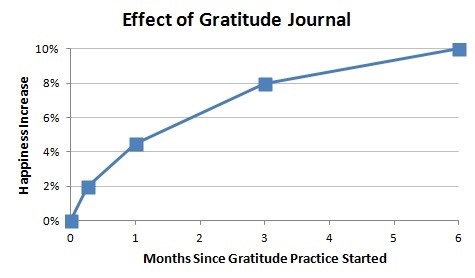There are many benefits of gratitude that you didn’t know about – these include emotional, personality, social, health, career and more.
Do you want more from your life? More happiness? Better health? Deeper relationships? Increased productivity? What if I told you that just one thing can help you in all of those areas? An Attitude of Gratitude.
Seriously? All that? Yes. This list of benefits was compiled by aggregating the results of more than 40 research studies on gratitude.

Gratitude makes us happier
A daily five-minute gratitude journal can increase your long-term well-being by more than 10 percent. That’s the same impact as doubling your income!
[Tweet “A daily five-minute gratitude journal can increase your long-term well-being”]
Gratitude improves our health, relationships, emotions, personality, and career. Sure, having more money can be great, but we quickly get used to it and stop having as much fun and happiness as we did at first.

The effects of a gratitude journal, when done consistently, does not fade over time.
Gratitude makes us healthier
Negative attitudes are bad for you. And gratitude, it turns out, makes you happier and healthier. If you can find any authentic reason to give thanks and put your attention there, then statistics say you’re going to be better off. Recent studies have concluded that the expression of gratitude can have profound and positive effects on our health.
There is even reason to believe gratitude can extend your lifespan by a few months or even years.
Gratitude helps your marriage
As marriages move past the honeymoon stage, couples go from appreciating and loving every little detail about each other to taking each other for granted. Amie Gordon, a psychologist from U.C. Berkeley, blames this for the downfall of many relationships, ‘You get used to having [your spouse] in your life and forget why you chose to be with them.” It is easy to become deadened to our spouse’s special qualities and instead focus on things that annoy us about them.
The key to sparking healthy relationships with gratitude is to take the initiative. Instead of just waiting for the other person to make you feel good; you can jumpstart that cycle. You can take it into your own hands by focusing on what is good in your relationship.
Start with small and easily achievable goals, such as giving your spouse five compliments a day, or simply smiling at him (or her) more often.
Gratitude is a skill that you cultivate – nurture it in yourself, and soon you will see positivity radiate back at you.
Gratitude makes you more effective as you balance work and life demands
Sociologists sometimes call the management of familial duties “worry work,” and the person who does it the “designated worrier,” which is usually the mother.
While fathers are helping more with household work and childcare, women still do more of the worry work. This includes keeping track of all the intricate details of taking care of children. These include tasks such as coordinating when they have to go to the doctor, when they need a permission slip for school, what they will eat for dinner and the endless list.
[Tweet “Sociologists sometimes call the management of familial duties “worry work,” and the person who does it the “designated worrier,” which is usually the mother.”]
So, in addition to our job demands, there is tons of pressure on mothers to be the right kind of mother who keeps all the details straight and our families organized. That’s our big challenge and the pursuit of the seemingly elusive “work-life balance”.
Cultivating an attitude of gratitude every day you wake up in the morning arises from how you look at things. Take on the day with an attitude of you can do this and leave the guilt behind. It is okay to take care or yourself, be grateful that you have children to care for and a support system you can call on. You level of gratitude increases as you recognize the real value of the people and things in your life. [Read: Dose of Dose]
Gratitude, then, is something you can encourage, something you can learn by consciously choosing to see the good and beautiful things in your life until doing so becomes automatic.
Gratitude is no cure-all, but it is a massively underutilized tool for improving life-satisfaction and happiness.
This month of November, why not start a gratitude journal and write down something you are thankful for every day?



